高考英语系列知识串讲(全程十七讲完整版)【绝对精品典藏版】
- 格式:pdf
- 大小:662.75 KB
- 文档页数:68
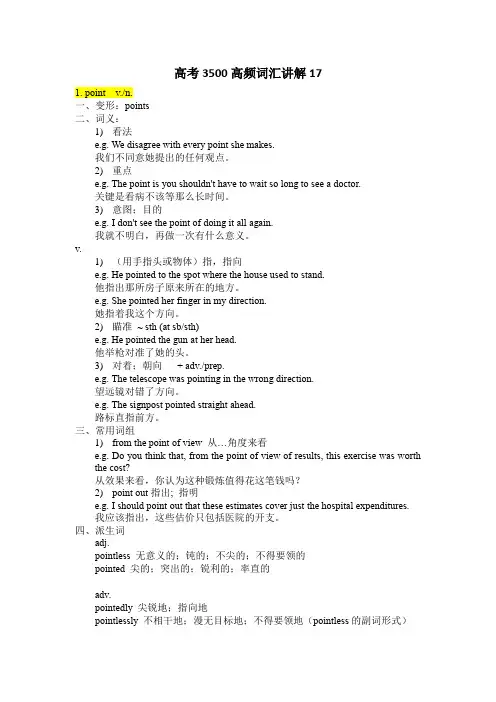
高考3500高频词汇讲解171. point v./n.一、变形:points二、词义:1)看法e.g. We disagree with every point she makes.我们不同意她提出的任何观点。
2)重点e.g. The point is you shouldn't have to wait so long to see a doctor.关键是看病不该等那么长时间。
3)意图;目的e.g. I don't see the point of doing it all again.我就不明白,再做一次有什么意义。
v.1)(用手指头或物体)指,指向e.g. He pointed to the spot where the house used to stand.他指出那所房子原来所在的地方。
e.g. She pointed her finger in my direction.她指着我这个方向。
2)瞄准~ sth (at sb/sth)e.g. He pointed the gun at her head.他举枪对准了她的头。
3)对着;朝向+ adv./prep.e.g. The telescope was pointing in the wrong direction.望远镜对错了方向。
e.g. The signpost pointed straight ahead.路标直指前方。
三、常用词组1)from the point of view 从…角度来看e.g. Do you think that, from the point of view of results, this exercise was worththe cost?从效果来看,你认为这种锻炼值得花这笔钱吗?2)point out指出; 指明e.g. I should point out that these estimates cover just the hospital expenditures.我应该指出,这些估价只包括医院的开支。

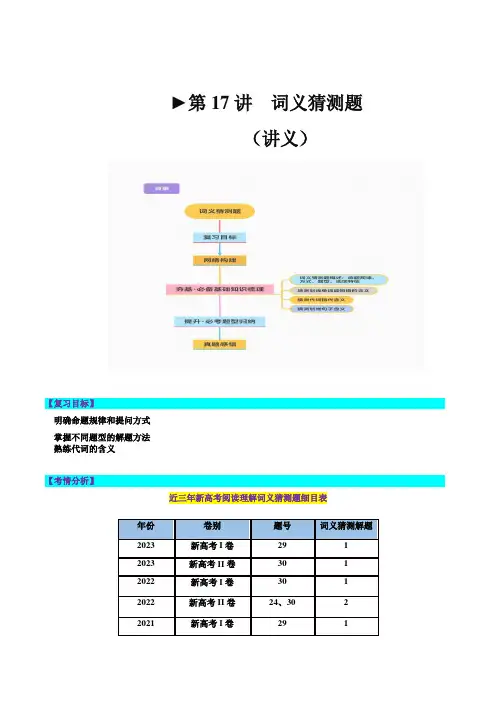
►第17讲词义猜测题(讲义)【复习目标】明确命题规律和提问方式掌握不同题型的解题方法熟练代词的含义【考情分析】近三年新高考阅读理解词义猜测题细目表【网络构建】命题规律:词义猜测题是高考阅读理解试题中的必考题型, 可以是对一个单词意义的推断,也可以是对一个短语或句子的推断,既可以考查生词的意义,也可以考查熟词的新意,可以考查替代词的内容。
在阅读理解题中,所考查的词或短语大多超出考纲的范围,需要根据语境进行推测其含义。
平时的训练中应当注意生词和短语的积累,还要掌握构词法,和一定的解题技巧。
题型和考查角度:1.猜测生词或熟词生义。
2.猜测短语的意义。
3.猜测代替词所替代的内容。
4.猜测句意。
命题方式:The phrase“...”in the sentence could be replaced by“”.The word “...”in the paragraph refer to“”.What is the meaning of the underlined word in the.. paragraph?Which of the following is the closest in meaning to the phrase“...”?The word“...”most nearly means“”.The underlined sentence in the... paragraph implies that .解题技巧:文中画线处上下文。
2.理解上下文,查找提示点,根据背景、上下文等线索推测生词词义。
选项特征:1.根据定义推测词义有时作者会通过给词汇下定义来帮助读者理解该词的基本含义,如线索词that is, or, namely, in other words, that is to say, to be more exact, to put it another way, which is等。
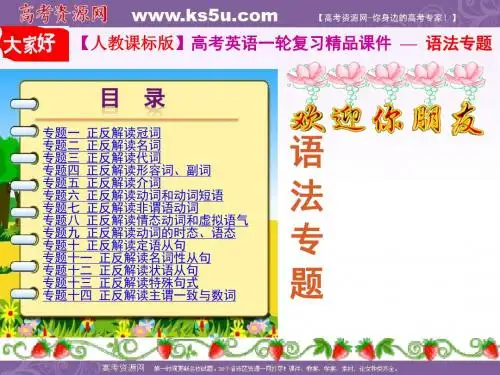


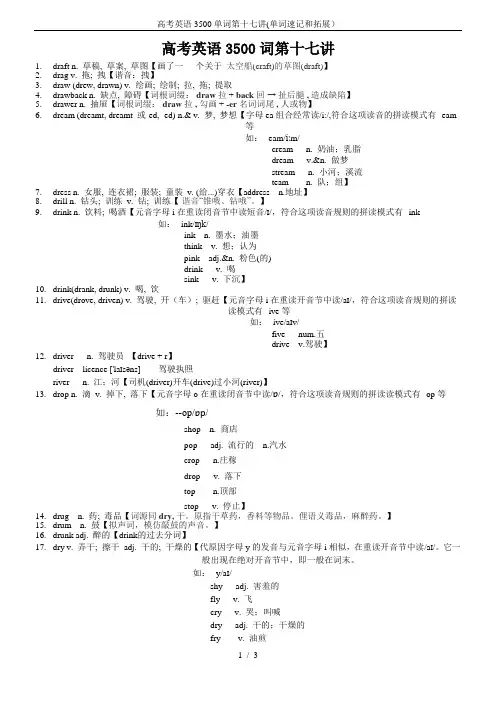
高考英语3500词第十七讲1.draft n. 草稿, 草案, 草图【画了一个关于太空船(craft)的草图(draft)】2.drag v. 拖; 拽【谐音:拽】3.draw (drew, drawn) v. 绘画; 绘制; 拉, 拖; 提取4.drawback n. 缺点, 障碍【词根词缀:draw拉 + back回→扯后腿,造成缺陷】5.drawer n. 抽屉【词根词缀:draw拉,勾画 + -er名词词尾,人或物】6.dream (dreamt, dreamt 或-ed, -ed) n.& v. 梦, 梦想【字母ea组合经常读/i:/,符合这项读音的拼读模式有--eam等如:--eam/iːm/cream n. 奶油;乳脂dream v.&n. 做梦stream n. 小河;溪流team n. 队;组】7.dress n. 女服, 连衣裙; 服装; 童装v. (给...)穿衣【address n.地址】8.drill n. 钻头; 训练v. 钻; 训练【谐音“锥哦、钻哦”。
】9.drink n. 饮料; 喝酒【元音字母i在重读闭音节中读短音/ɪ/,符合这项读音规则的拼读模式有--ink如:--ink/ɪŋk/ink n. 墨水;油墨think v. 想;认为pink adj.&n. 粉色(的)drink v. 喝sink v. 下沉】10.drink(drank, drunk) v. 喝, 饮11.drive(drove, driven) v. 驾驶, 开(车); 驱赶【元音字母i在重读开音节中读/aɪ/,符合这项读音规则的拼读读模式有--ive等如:--ive/aɪv/five num.五drive v.驾驶】12.driver n. 驾驶员【drive + r】driver licence ['laɪsəns] 驾驶执照river n. 江;河【司机(driver)开车(drive)过小河(river)】13.drop n. 滴v. 掉下, 落下【元音字母o在重读闭音节中读/ɒ/,符合这项读音规则的拼读读模式有--op等如:--op/ɒp/shop n. 商店pop adj. 流行的n.汽水crop n.庄稼drop v. 落下top n.顶部stop v. 停止】14.drug n. 药; 毒品【词源同dry,干。
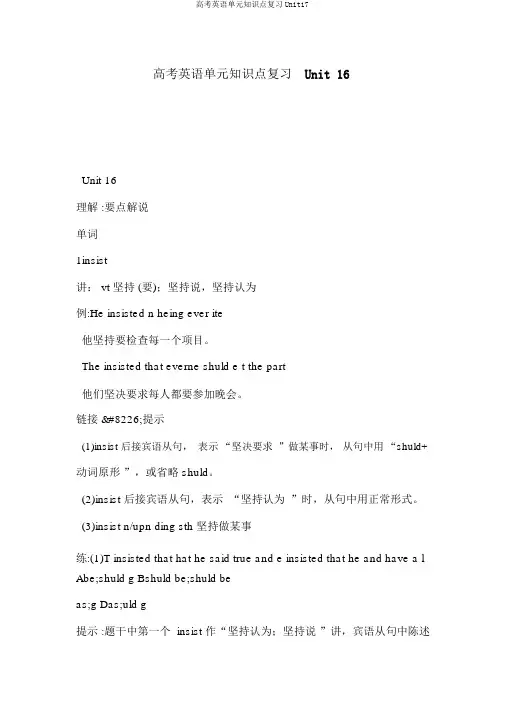
高考英语单元知识点复习Unit 16Unit 16理解 :要点解说单词1insist讲: vt 坚持 (要);坚持说,坚持认为例:He insisted n heing ever ite他坚持要检查每一个项目。
The insisted that everne shuld e t the part他们坚决要求每人都要参加晚会。
链接 •提示(1)insist 后接宾语从句,表示“坚决要求”做某事时,从句中用“shuld+动词原形”,或省略 shuld。
(2)insist 后接宾语从句,表示“坚持认为”时,从句中用正常形式。
(3)insist n/upn ding sth 坚持做某事练:(1)T insisted that hat he said true and e insisted that he and have a l Abe;shuld g Bshuld be;shuld beas;g Das;uld g提示 :题干中第一个 insist 作“坚持认为;坚持说”讲,宾语从句中陈述语气;第二个insist 作“坚决要求”讲,宾语从句中用shuld d 或省略shuld。
答案 :(2)(2010 江苏模拟)The an insisted __________________a taxi fr e even thugh I tld hi I lived nearbAfind Bt findn finding Din finding提示 :此题察看 insist n ding sth。
答案 :(3)—h as Prfessr Zhang unhapp reentl?—Beause the ther he insisted n______________________ rng Aprved Bprvingbeing prved Das prved提示 :此题受 insist n ding sth 的影响,很简单误选 B 项。
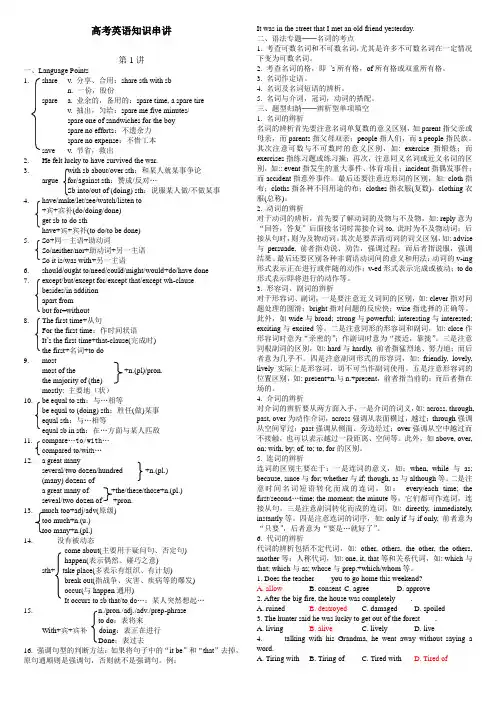
高考英语知识串讲第1讲一、Language Points1.sharev.分享、合用:share sth with sb n. 一份,股份 spare a. 业余的,备用的:spare time, a spare tirev. 抽出,匀给:spare me five minutes/spare one of sandwiches for the boyspare no efforts :不遗余力spare no expense :不惜工本save v. 节省,救出2. He felt lucky to have survived the war.3. with sb about/over sth :和某人就某事争论 argue for/against sth :赞成/反对… Sb into/out of (doing) sth :说服某人做/不做某事4. have/make/let/see/watch/listen to+宾+宾补(do/doing/done) get sb to do sth have+宾+宾补(to do/to be done) 5. So+同一主语+助动词 So/neither/nor+助动词+另一主语 So it is/was with+另一主语6. should/ought to/need/could/might/would+do/have done7. except/but/except for/except that/except wh-clause besides/in addition apart from but for=without8. The first time+从句 For the first time :作时间状语 It ’s the first time+that-clause(完成时) the first+名词+to do9. most most of the +n.(pl)/pron. the majority of (the) mostly: 主要地(状) 10. be equal to sth :与…相等 be equal to (doing) sth :胜任(做)某事 equal sth :与…相等 equal sb in sth :在…方面与某人匹敌 11. compar e …to/with … compared to/wit h … 12. a great many several/two dozen/hundred +n.(pl.) (many) dozens of a great many of +the/these/those+n.(pl.) seveal/two dozen of +pron. 13. much too+adj/adv(原级) too much+n.(u.) too many+n.(pl.) 14. 没有被动态 come about(主要用于疑问句、否定句) happen(表示偶然、碰巧之意) sth+ take place(多表示有组织、有计划) break out(指战争、灾害、疾病等的爆发)occur(与happen 通用) It occurs to sb that/to d o …:某人突然想起… 15. n./pron./adj./adv./prep-phrase to do :表将来 With+宾+宾补 doing :表正在进行 Done :表过去16. 强调句型的判断方法:如果将句子中的“it be ”和“that ”去掉,原句通顺则是强调句,否则就不是强调句。
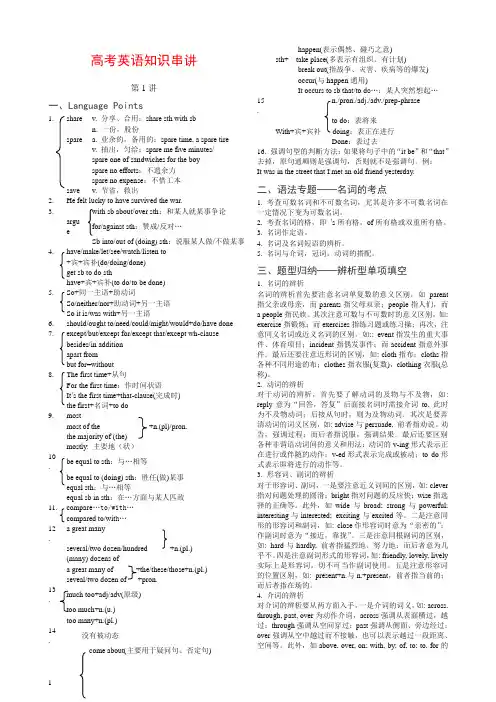
1 高考英语知识串讲第1讲一、Language Points1. sharev. 分享、合用:share sth with sbn. 一份,股份sparea. 业余的,备用的:spare time, a spare tirev. 抽出,匀给:spare me five minutes/spare one of sandwiches for the boyspare no efforts :不遗余力spare no expense :不惜工本save v. 节省,救出2. He felt lucky to have survived the war.3. with sb about/over sth :和某人就某事争论 argue for/against sth :赞成/反对…Sb into/out of (doing) sth :说服某人做/不做某事 4. have/make/let/see/watch/listen to +宾+宾补(do/doing/done) get sb to do sthhave+宾+宾补(to do/to be done) 5. So+同一主语+助动词So/neither/nor+助动词+另一主语 So it is/was with+另一主语6. should/ought to/need/could/might/would+do/have done7. except/but/except for/except that/except wh-clause besides/in addition apart frombut for=without 8. The first time+从句For the first time :作时间状语It ’s the first time+that-clause(完成时) the first+名词+to do 9. mostmost of the +n.(pl)/pron. the majority of (the) mostly: 主要地(状) 10. be equal to sth :与…相等be equal to (doing) sth :胜任(做)某事 equal sth :与…相等equal sb in sth :在…方面与某人匹敌 11. compar e …to/with … compared to/wit h … 12. a great manyseveral/two dozen/hundred +n.(pl.) (many) dozens ofa great many of +the/these/those+n.(pl.) seveal/two dozen of +pron. 13. much too+adj/adv(原级) too much+n.(u.) too many+n.(pl.) 14. 没有被动态come about(主要用于疑问句、否定句)happen(表示偶然、碰巧之意) sth+ take place(多表示有组织、有计划)break out(指战争、灾害、疾病等的爆发)occur(与happen 通用)It occurs to sb that/to d o …:某人突然想起… 15. n./pron./adj./adv./prep-phraseto do :表将来 With+宾+宾补 doing :表正在进行 Done :表过去 16. 强调句型的判断方法:如果将句子中的“it be ”和“that ”去掉,原句通顺则是强调句,否则就不是强调句。
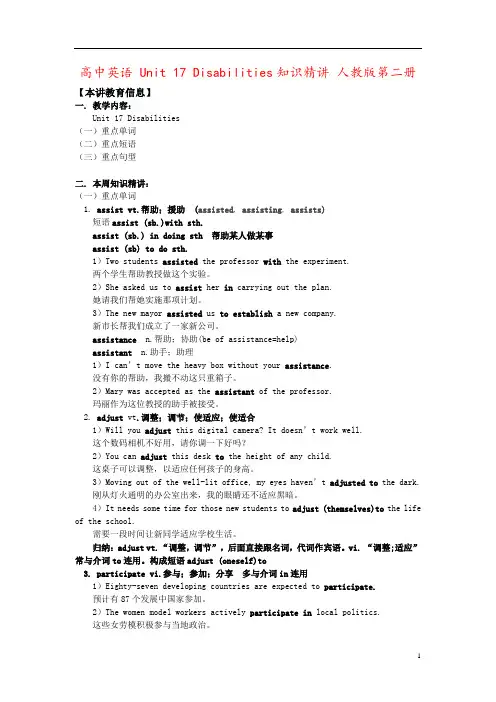
高中英语 Unit 17 Disabilities知识精讲人教版第二册【本讲教育信息】一. 教学内容:Unit 17 Disabilities(一)重点单词(二)重点短语(三)重点句型二. 本周知识精讲:(一)重点单词1. assist vt.帮助;援助 (assisted, assisting, assists)短语assist (sb.)with sth.assist (sb.) in doing sth 帮助某人做某事assist (sb) to do sth.1)Two students assisted the professor with the experiment.两个学生帮助教授做这个实验。
2)She asked us to assist her in carrying out the plan.她请我们帮她实施那项计划。
3)The new mayor assisted us to establish a new company.新市长帮我们成立了一家新公司。
assistance n.帮助;协助(be of assistance=help)assistant n.助手;助理1)I can’t move the heavy box without your assistance.没有你的帮助,我搬不动这只重箱子。
2)Mary was accepted as the assistant of the professor.玛丽作为这位教授的助手被接受。
2. adjust vt.调整;调节;使适应;使适合1)Will you adjust this digital camera? It doesn’t work well.这个数码相机不好用,请你调一下好吗?2)You can adjust this desk to the height of any child.这桌子可以调整,以适应任何孩子的身高。
落堕市安心阳光实验学校高考常考基本词汇讲解讲义系列(十七)重点单词详解1.harmony n. 协调;和谐harmonious adj. 和谐的;和睦的;一致的in harmony (with...) (和……)一致/和睦/和谐out of harmony (with...) (和……)不一致/不和睦/不和谐1)The ________ of sea and sky makes a beautiful picture. 大海与蓝天之间的和谐构成了一幅美丽的图画。
2)She has a natural sense of ________. 她天生有种和谐感/协调能力。
3)There can be no ________ between two selfish people. 两个自私的人之间不可能和谐。
4)The tribes there live ________ ________ ________ nature. 那儿的部落与自然和睦相处。
5)Your suggestions are not ________ ________ ________ the aims of the project. 你的建议与本项目的目标不一致。
【答案】1)harmony 2)harmony 3)harmony 4)in harmony with 5)in harmony with(1)单项填空This red tie is not in ________ with your newly-bought shirt. A.need B.deed C.harmony D.fi【答案与解析】 C in harmony with “与……和谐相处;与……相配”。
(2)名校押题I went along thinking of nothing ________, only looking at things around me.A.in particular B.in harmony C.in doubt D.in brief 【答案与解析】 A 题意:我行走时没有想什么特别的,只是环顾周围事物。
高考英语核心词汇辨析与解析(十七)1. contribute /kən'trɪbjuːt; 'kɒntrɪbjuːt/ v. 贡/捐献;造成,促使;投稿拓展(1)contribute to 有助于;促成;为……做贡献contribute...to/towards ...向……捐赠;向……投稿(2)contribution n. 贡献;捐献;捐助make a contribution/contributions to/towards ...为……做贡献例句①The scientist was rewarded by the government for having made such a great contribution to the country.这位科学家因对国家做了这么大的贡献而受到奖励。
②Finally, some good English study websites contribute a lot to my improvement in English.最后,一些好的英语学习网站也对我的英语水平提高起了很大作用。
串记Your success should contribute to the success of others! Everyone should make contributions to others and the whole society.你的成功应该有助于他人的成功! 每个人都应该为他人和整个社会做出贡献。
Many people contributed money to the poor boy, which contributed to his returning to school.A writer wrote a story about this and contributed it to a newspaper.许多人捐钱给这个可怜的男孩,这促成了他重返学校。
2024年高考英语语法历年真题知识点串讲本文为高考英语语法知识点串讲,涵盖了历年高考英语真题中的重要语法知识。
通过对真题的分析和归纳,旨在帮助考生系统地复习和掌握英语语法,从而在2024年的高考中取得好成绩。
第一部分:词类与词性1. 名词 (Noun)名词是指人、事物、地点等具体或抽象的东西。
名词可分为可数名词和不可数名词两种。
可数名词有单数和复数形式,而不可数名词没有复数形式。
2. 代词 (Pronoun)代词用来替代和指代名词。
根据在句中的不同功能,代词可分为人称代词、物主代词、反身代词、指示代词、疑问代词、不定代词等。
3. 动词 (Verb)动词表示动作、状态或存在的词。
根据不同的形式,动词可分为系动词、及物动词和不及物动词。
4. 形容词 (Adjective)形容词用来描述和修饰名词。
它可以表示人或物的性质、特征、状态等。
形容词可用来比较,形成原级、比较级和最高级。
5. 副词 (Adverb)副词用来修饰动词、形容词、其他副词或整个句子。
副词可以表示时间、地点、方式、原因、程度等。
6. 介词 (Preposition)介词用来表示名词和其他词之间的关系。
它通常用来表示方向、位置、时间、原因等。
7. 连词 (Conjunction)连词用来连接词与词、词与短语、短语与短语,或句子与句子。
连词可以分为并列连词、从属连词和连接副词。
8. 冠词 (Article)冠词是放在名词前面的一类小词,主要有定冠词和不定冠词。
定冠词有“the”,不定冠词有“a”和“an”。
第二部分:句子结构与句型1. 主谓一致 (Subject-Verb Agreement)主谓一致是指主语和谓语动词在人称、数和时态上保持一致。
注意特殊情况,如当主语是复数名词时,谓语动词用单数形式。
2. 并列句与复合句 (Compound Sentences and Complex Sentences)并列句由两个或多个主要部分组成,每个部分都有自己的主语和谓语。
2012高考英语知识串讲第1讲一、Language Points1.share v. 分享、合用:share sth with sbn. 一份,股份spare a. 业余的,备用的:spare time, a spare tire v。
抽出,匀给:spare me five minutes/spare one of sandwiches for the boyspare no efforts:不遗余力spare no expense:不惜工本2。
He felt lucky to have survived the war.3。
with sb about/over sth:和某人就某事争论argue for/against sth:赞成/反对…Sb into/out of (doing) sth:说服某人做/不做某事4. have/make/let/see/watch/listen to+宾+宾补(do/doing/done)get sb to do sthhave+宾+宾补(to do/to be done)5。
So+同一主语+助动词So/neither/nor+助动词+另一主语So it is/was with+另一主语6。
should/ought to/need/could/might/would+do/have done8。
The first time+从句For the first time:作时间状语It’s the first time+that—clause(完成时)the first+名词+to do10. be equal to sth:与…相等be equal to (doing)sth:胜任(做)某事equal sth:与…相等equal sb in sth:在…方面与某人匹敌11. compare…to/with…compared to/with…12。
a great manyseveral/two dozen/hundred +n.(pl.)(many)dozens ofa great many of +the/these/those+n。
高考英语知识串讲第1讲一、Language Points1. share v. 分享、合用:share sth with sbn. 一份,股份spare a. 业余的,备用的:spare time, a spare tirev. 抽出,匀给:spare me five minutes/spare one of sandwiches for the boyspare no efforts:不遗余力spare no expense:不惜工本save v. 节省,救出2. He felt lucky to have survived the war.3. with sb about/over sth:和某人就某事争论argue for/against sth:赞成/反对,Sb into/out of (doing) sth:说服某人做/不做某事4. have/make/let/see/watch/listen to+宾+宾补(do/doing/done)get sb to do sthhave+宾+宾补(to do/to be done)5. So+同一主语+助动词So/neither/nor+助动词+另一主语So it is/was with+另一主语6. should/ought to/need/could/might/would+do/have done7. except/but/except for/except that/except wh-clausebesides/in additionapart frombut for=without8. The first time+从句For the first time:作时间状语It’s the first time+that-clause(完成时)the first+名词+to do9. mostmost of the +n.(pl)/pron.the majority of (the)mostly: 主要地(状)10. be equal to sth:与,相等be equal to (doing) sth:胜任(做)某事equal sth:与,相等equal sb in sth:在,方面与某人匹敌11. compare,to/with,compared to/wit h,12. a great manyseveral/two dozen/hundred +n.(pl.)(many) dozens ofa great many of +the/these/those+n.(pl.)seveal/two dozen of +pron.13. much too+adj/adv(原级)too much+n.(u.)too many+n.(pl.)14. 没有被动态come about(主要用于疑问句、否定句)happen(表示偶然、碰巧之意)sth+ take place(多表示有组织、有计划)break out(指战争、灾害、疾病等的爆发)occur(与happen通用)It occurs to sb that/to do,:某人突然想起,15. n./pron./adj./adv./prep-phraseto do:表将来With+宾+宾补doing:表正在进行Done:表过去16. 强调句型的判断方法:如果将句子中的“it be”和“that”去掉,原句通顺则是强调句,否则就不是强调句。
例:It was in the street that I met an old friend yesterday.二、语法专题──名词的考点1. 考查可数名词和不可数名词,尤其是许多不可数名词在一定情况下变为可数名词。
2. 考查名词的格,即’s所有格,of所有格或双重所有格。
3. 名词作定语。
4. 名词及名词短语的辨析。
5. 名词与介词,冠词,动词的搭配。
三、题型归纳──辨析型单项填空1. 名词的辨析名词的辨析首先要注意名词单复数的意义区别,如parent指父亲或母亲,而parents指父母双亲;people指人们,而 a people指民族。
其次注意可数与不可数时的意义区别,如: exercise指锻炼;而exercises指练习题或练习操;再次,注意同义名词或近义名词的区别,如:: event指发生的重大事件、体育项目;incident 指偶发事件;而accident指意外事件。
最后还要注意近形词的区别,如: cloth指布;cloths指各种不同用途的布;clothes指衣服(复数),clothing衣服(总称)。
2. 动词的辨析对于动词的辨析,首先要了解动词的及物与不及物,如: reply意为“回答,答复”后面接名词时需接介词to, 此时为不及物动词;后接从句时,则为及物动词。
其次是要弄清动词的词义区别,如: advise与persuade, 前者指劝说、劝告,强调过程;而后者指说服,强调结果。
最后还要区别各种非谓语动词间的意义和用法:动词的v-ing形式表示正在进行或伴随的动作;v-ed形式表示完成或被动;to do形式表示即将进行的动作等。
3. 形容词、副词的辨析对于形容词、副词,一是要注意近义词间的区别,如: clever指对问题处理的圆滑;bright指对问题的反应快;wise指选择的正确等。
此外,如wide与broad; strong与powerful; interesting与interested; exciting与excited 等。
二是注意同形的形容词和副词,如: close作形容词时意为“亲密的”;作副词时意为“接近,靠拢”。
三是注意同根副词的区别,如: hard与hardly, 前者指猛烈地、努力地;而后者意为几乎不。
四是注意副词形式的形容词,如: friendly, lovely, lively实际上是形容词,切不可当作副词使用。
五是注意形容词的位置区别,如: present+n.与n.+present,前者指当前的;而后者指在场的。
4. 介词的辨析对介词的辨析要从两方面入手,一是介词的词义,如: across, through, past, over为动作介词,across强调从表面横过,越过;through强调从空间穿过;past强调从侧面、旁边经过;over强调从空中越过而不接触,也可以表示越过一段距离、空间等。
此外,如above, over, on; with, by; of, to; to, for的区别。
5. 连词的辨析连词的区别主要在于:一是连词的意义,如:when, while与as; because, since与for; whether与if; though, as 与although等。
二是注意时间名词短语转化而成的连词,如:every/each time; the first/secon d,time; the moment; the minute等,它们都可作连词,连接从句。
三是注意副词转化而成的连词,如: directly, immediately, instantly等。
四是注意连词的词序,如: only if与if only, 前者意为“只要”,后者意为“要是,就好了”。
6. 代词的辨析代词的辨析包括不定代词,如: other, others, the other, the others, another等;人称代词,如: one, it, that等和关系代词,如: which与that; which与as; whose与prep.+which/whom等。
1. Does the teacher____ you to go home this weekend?A. allowB. consentC. agreeD. approve2. After the big fire, the house was completely____.A. ruinedB. destroyedC. damagedD. spoiled3. The hunter said he was lucky to get out of the forest____.A. livingB. aliveC. livelyD. live4. ____ talking with his Grandma, he went away without saying a word.A. Tiring withB. Tiring ofC. Tired withD. Tired of5. It’s necessary to have some____ knowledge for this job.A. electricB. electricalC. elctronD. electricity6. The photo____ on the wall was taken in Beijing last year.A. hangB. hangingC. hungD. hanged7. On New Year’s Day, people, especially girls, always wear new____-new hats, new coats, new trousers and newshoes.A. clothesB. clothingC. clothD. cloths8. He stays up____ in the evenings to go online to get the____ information.A. late, latestB. lately, lastC. late, lastD. latest, latest9. ____ is it to ask her about her about that? She doesn’t know it either.A. What goodB. How goodC. What a goodD. How much good10. ____ I had done it I knew I had made a mistake.A. HardlyB. DirectlyC. mostlyD. Nearly11. It is said you went to see Jenny yesterday. What has become___ her?A. fromB. ofC. intoD. /12. Who do you think will be allowed____ there tomorrow?A. visitB. to visitC. visitingD. visited13. Today we can either fly to Hainan Island or take a ship___ the sea.A. inB. acrossC. from inD. across from14. You wil find what great benefit the computer you own can be____ each time you use it to help you work.A. forB. ofC. atD. on15. I thought he was not____ of a professor the first time I heard him speaking to the children at the platform in the hall of our school.A. somethingB. anythingC. somebodyD. anybody16. We’ve missed the last bus. I’m afraid we have no____ but to take a taxi.A. wayB. choiceC. possibilityD. selection17. ____ students have graduated from this school in the last twenty years.A. Tens of thousands ofB. Tens upon thousands ofC. Tens in thousandsD. Ten thousands of18. The farmers plan to produce three times____ in the year before last to meet the increasing need of the people.A. of crop as much this year asB. as much crop this year asC. as more crop this year asD. much crop this year than19. I think the house is____ large for a family of four people and the price is very reasonable.A. tooB. ratherC. fairlyD. a little20. His mother dislikes him, for he____ lies.A. tellsB. is always tellingC. has toldD. always told1-5 ABBDB 6-10 BBAAB 11-15 BBDBB 16-20 BABCB第2讲一、Language points1. sb./sth.+adj/nsb./sth.+to doconsider(以为,认为)+sb./sth.+asthat-clausen.consider(考虑)+doing疑问词+to do sth“把,当作,”的译法:consider,as=think of/look on/take/regard/treat/hav e,as2. to doA way+ of doing(that/in which)+定语从句A method of doing sthby this meansYou can solve the problem+ with this methodin this wayby means of:通过,方式,以,手段by this/that means:通过这种/那种方式by all means:务必,一定;(用于回答)当然行,请by no means:决不,一点也不(用于句首时用倒装)3. protect,(from) doing sthprevent/stop,(from) doing sthkeep,from doingkeep,doingunder the potection of…4. as wellas well asmight/may as well=had better5. to dospecially+ for-phraseespecially6. along the river:沿着河流over the river:在河的正上方through the forest:穿过森林by the river:在河边on the bank:在河岸上7. follow the instructionsfollow one’s adviceas follows8. be responsible to sb for sth9. n.doing/to do sthsb to do sthprefer+ sth to sthdoing A to doing Bto do A rather than do sththat sb (should) do sth10. n.+after +n.=one +n. +after another一个接一个(强调动作的重复)n. +by +n.: 一个接一个(强调动作的变化)tree after tree/day by day11. say ―hi‖ to sb.Please remember me to sb.向“某人”问好Send my regards to sb.Send the best wishes to sb.12. 主+be +adj. +to do: 不定式一般用主动式,与主语存在逻辑上的动宾关系,所以当不定式的动词是不及物动词时,则应在其后加上适当的介词。